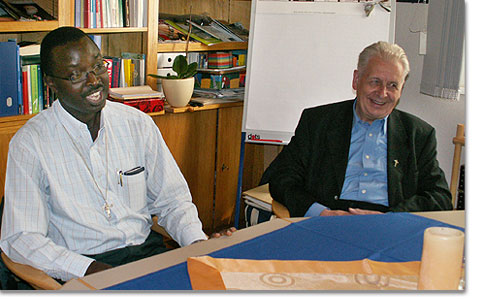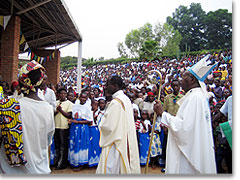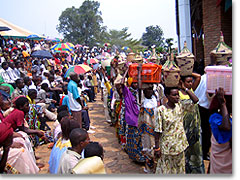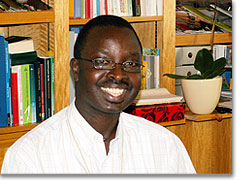
|
| P. Deogratias Marahukiro, Burundi, con el P. José Barmettler Fr. Deogratias Marahukiro, Burundi, with Fr. Joseph Barmettler P. Deogratias Marahukiro, Burundi, mit Pater Josef Barmettler Foto: POS Fischer © 2007 |
 |
|
| 15 de agosto de 2007 en Mont Sión Gikungu – gran peregrinación con 15.000 personas August 15, 2007, at Mount Sion Gikungu – gmassive pilgrimage with 15,000 participants 15. August 2007 in Mont Sion Gikungu – große Wallfahrt mit über 15.000 Teilnehmern |
|
 |
|
| Peregrinos llevan el capital de gracias Pilgrims bring the capital of grace Pilger bringen Beiträge zum Gnadenkapital Fotos: Sr Lisette Seitzer © 2007 |
|
 |
|
| P. Deogratias Marahukiro Fr. Deogratias Marahukiro P. Deogratias Marahukiro Foto: POS Fischer © 2007 |
|
BURUNDI, After twelve years of civil war, Burundi, a small country in eastern Africa, is yearning for reconciliation, peace, and a better future. Mount Zion, the Shrine of the Mother Thrice Admirable, is the second Schoenstatt Shrine in Burundi, and has been and continues to be a place of reconciliation and of evangelization. The Shrine is located in the capital, Bujumbura, often the epicenter of shootings, and more often, a refuge for thousands of fugitives. There are thousands upon thousands of pilgrims who attend Mass in the large Holy Trinity Church, but who never leave the grounds without greeting the Blessed Mother in Her small Shrine. Over the next three years, the Schoenstatt Family, along with the Church of Burundi, wants to crown the Blessed Mother as Queen of Peace and of Reconciliation.
Based on the population, Burundi is the country with the largest percentage of Schoenstatters. We spoke with Father Deogratias Marhukiro, the first Burundian Schoenstatt Father, who after a year of pastoral work with the Movement in Chile, Argentina, and Paraguay, is presently the National Advisor of the People’s Movement and of Pilgrims. Father José Barmettler, from Switzerland, who worked many years in Burundi, during the interview added some valuable background information.
What is the difference between the way Schoenstatt is experienced in Latin America, or rather in Paraguay, and Schoenstatt in Burundi?
Father Deo: At this time, I have worked in Burundi for one year since returning from Paraguay, where I had a beautiful experience with the Paraguayan Schoenstatt family as well as in Chile. These experiences are giving fruit in my country, Burundi. The difference is that in South America – Chile, Paraguay – Schoenstatt is very advanced; it has been in place for a long time, with much experience. In Burundi there is also a large Schoenstatt Movement, even so, we have to grow in experience. It is mostly made up of many young people, and we do not have many adult branches, for example, at this time we still do not have a Family Work. Based on what I saw in Paraguay, Chile, and Argentina, the Movement for adults and couples is extremely varied; that is the difference. But here in Burundi we have many people who really want to know more about the Movement. We are also a Marian people; in this respect it is very much like Paraguay.
The countries within the great lakes region of Central Africa, especially Burundi and Rwanda, as well as Congo and Tanzania, have a great number of Catholics, and they are also open to the Movements. At this time we are beginning in the Congo where there is great development in the Movement. What I see in Burundi, for example, is a great opportunity because all the dioceses and the bishops are open, and they go on pilgrimage to our center from all the parishes. Schoenstatt is very well known in Burundi, on par with the meetings I also had with bishops of Rwanda and Congo, so that we will have to see what happens in the regard to future fruit in Africa. It is possible that there will be a great development of Schoenstatt in the Congo, Rwanda, and in Burundi, since the people there are very open because they are very Marian and Schoenstatt has the Blessed Mother’s seed.
How did the idea of the coronation emerge?
Father Deo: Last year on August 15th, the Feast of the Assumption, we prayed a novena, and the idea of crowning the Blessed Mother as Queen of Peace came to me. Afterwards, I perceived that there was a great current along these lines and many blessings and graces flowed.
In fact, since then, there were many difficulties with the government also, with many people jailed, and the people began to pray for peace in the Shrine, and they saw how the Blessed Mother responded.
Among these people was a former president of the Republic, who always came to the Shrine, and the people saw that the Blessed Mother had answered their prayers. At the moment, I have a program on Radio Mary where I speak about the subject of the coronation, a topic that we have been preparing throughout the country. Every Sunday I broadcast on Radio Mary about the Blessed Mother in our life and I always talk about the coronation.
This year there was a youth pilgrimage, especially for students, all of them from the capital, and they made a crown for Mary. We want to give her our life in this coronation. The bishop also perceived this, so evidently the coronation is something that the Blessed Mother, herself, has sown in the hearts of the people, so we can say that she is the Queen of Peace and of Reconciliation. There are many graces of reconciliation in Burundi. Four or five years ago there were certain people who did not want to come to Mount Zion, now they all tell me: we have discovered that here there is something that attracts me to the Shrine. Now it is a gathering center for everyone, for politicians, for very simple people, people from the city; what the Blessed Mother is doing is wonderful.
In view of the coronation –which will be in the year 2009 – each year we will have a motto, this year’s is: Blessed Mother, my life, your crown. We want Mary to be the queen of our lives, so this year is dedicated to the Covenant of Love. There were many people who sealed the Covenant of Love, among them there were two ex-Muslims, who converted, and sealed their covenant this year. The motto for next year is: Blessed Mother, my family, your crown. We want Mary to be present in each family; from there we want to work with the Pilgrim MTA. In Burundi, our project is for each house and for every person who wants to receive a visit from the Blessed Mother to have that opportunity. There are many people who want to be missionaries and take Mary to each home. The year 2009 is very important in Burundi because it also an election year, and these are always very difficult. The motto will be: Our country, your crown. We want to give Mary the entire country represented by a crown.
It is evident that it is not only a motto, rather it is life…
Father Deo: Yes, it is life. We also work with the politicians, for example: the president, the ministers, the parliamentarians always come, and we want them to also enter into this stream of offering the country to the Blessed Mother. Furthermore, in the light of the coronation, we want to have a celebration each year for peace and reconciliation with songs and dances to forge a new culture of peace and of reconciliation. There are also politicians who come to the Shrine to reflect along with us as a Christian contribution to the country. In this sense I have already spoken with the bishop, who always supports us, and I have also spoken with the nuncio about the coronation, and they like the idea. The nuncio commented that the entire country should do it, and he wants this crown to be blessed by the Pope. For this reason we are asking the whole Schoenstatt Family to accompany us with their prayers in this current since peace is very important to us. The country cannot grow and develop if we do not have peace. Once again, we want to ask all the Schoenstatt Family to join us in this coronation current; that is very important. In view of my visit here at Schoenstatt, I spoke to the people who come and together with large amounts of contributions to the Capital of Grace, they told me to ask our Schoenstatt friends to join with us so that we will feel stronger on this road.
Do you have date for the coronation?
Father Deo: August 15, 2009, this is a very big celebration in Burundi. On that day three brothers will be ordained as priests and there will be a big celebration. The Cardinal from Santiago will come for this ordination in which the first Schoenstatt Father from Congo will be ordained.
In light of the coronation, we also have examples of the fruits from this endeavor. A foundation born in the shadow of the Shrine, the foundation, Mary Helps, encompasses three programs: a social program for street children for the poor, a cultural program, and an educational and development program. We believe that Mary also wants to help the people in the field of education and of development. That is why we say that each child that we take off the street will be like a pearl placed on the Blessed Mother’s crown.
When one has such great mottos such as to crown the Blessed Mother as Queen of our country, we may think: How do we do it? Sometimes, in the end, nothing is done. For this reason, this manifestation that each child that we take off the street is a pearl in the crown, is something very concrete…
Father Deo: It is the Blessed Mother who must be in charge; it is she who will have to help. We are based on the motto: Clarificate, prove yourself as admirable, in Kirundi, Nacasicao, or in simple words: it is your task, you have to do it. For this reason we are relaxed although we do not have any money; rather we say:, this is your business, see how you get along with this! We are going to face many projects with you and you have to do it. We are indeed happy and also amazed at what the Blessed Mother is doing. That is what we like to share with other people, that it is such a joy for us to see how the Blessed Mother is working.
Again, I always admire how she attracts people, we don’t do anything. We have daily Mass at 6:00 a.m., and 300 people always attend: children, youth, and ministers. It is always full of people, from Monday to Friday, on Saturday many more people come.
First, the people go to the Shrine before Mass, then they participate in the Mass, and then they go to greet Mary before going to work. When I ask them why they do it, they respond, first I visit the Blessed Mother and then I go to work.
We want to organize a large pilgrimage for soldiers. For this we have thought of having three bell towers for peace and for the inauguration, we will invite all the military, the rebels, and the officials that are now united. We had problems with a leader of a party, who was a Muslim, but the Blessed Mother worked so much that now he is in jail. He was someone who always gave privileges to the Muslims, and that is where problems arose. But there were problems among them in the party because of corruption, and that man who was the strongest man in the country is in jail now. The people said that he worked with the devil, or something like that, I don’t know, even the bishops were a little bit of afraid of him, but the people prayed so much in the Shrine that after they saw what happened to him they said: "The Blessed Mother has conquered." That is why we also want to crown the Blessed Mother, because she has truly shown herself as a queen. Nowadays, people from the government always come to the Shrine, and for that reason we want to organize this pilgrimage with all the military, which we are preparing, and we will also invite the president to make a march for peace.
For us this a wonder of the Blessed Mother, because it has not always been like this. Before we had problems with the previous government in Burundi, with the previous president, and priests were sent out of the country. Now this former president also came to Mount Zion, and he reconciled with the Church at the Shrine.
Father Barmettler: That is to say, the Shrine is a place where people who were formerly enemies gather. The only place in all of Burundi where enemies or former enemies can meet again is in the Shrine of Mount Zion in Burundi.
That is what the Church was in medieval times in Europe, a place of reconciliation, where no one who was under the protection of the Church could be killed. And this Shrine is only thirteen years old. The first Shrine is in Mutumba, but it is more to the interior of the country, and the bishop asked that Schoenstatt be present in the capital. They have only had the Shrine for thirteen years and the Pilgrims’ Church is three or four years old.
Father Deo: But it has grown a lot. The church is a large, without walls, it is like soccer field. It is a church with a roof, with everything, but it does not have walls, it can easily be enlarged. There was a charismatic conference for the Diocese of Bujumbura and more than 30,000 people came to our center. Thirty thousand people came to the evangelization conference that lasted for a whole week. It also gave great credibility because there were people who truly had an encounter with God; there were many experiences of returning to the Church. It was incredible. I also think that the Blessed Mother chose this shrine as a mission for the country because we began during a very difficult time, in 1994, in the darkest period in the history of our country.
Translation: Celina Garza, Harlingen, TX, USA /amj
Part 2